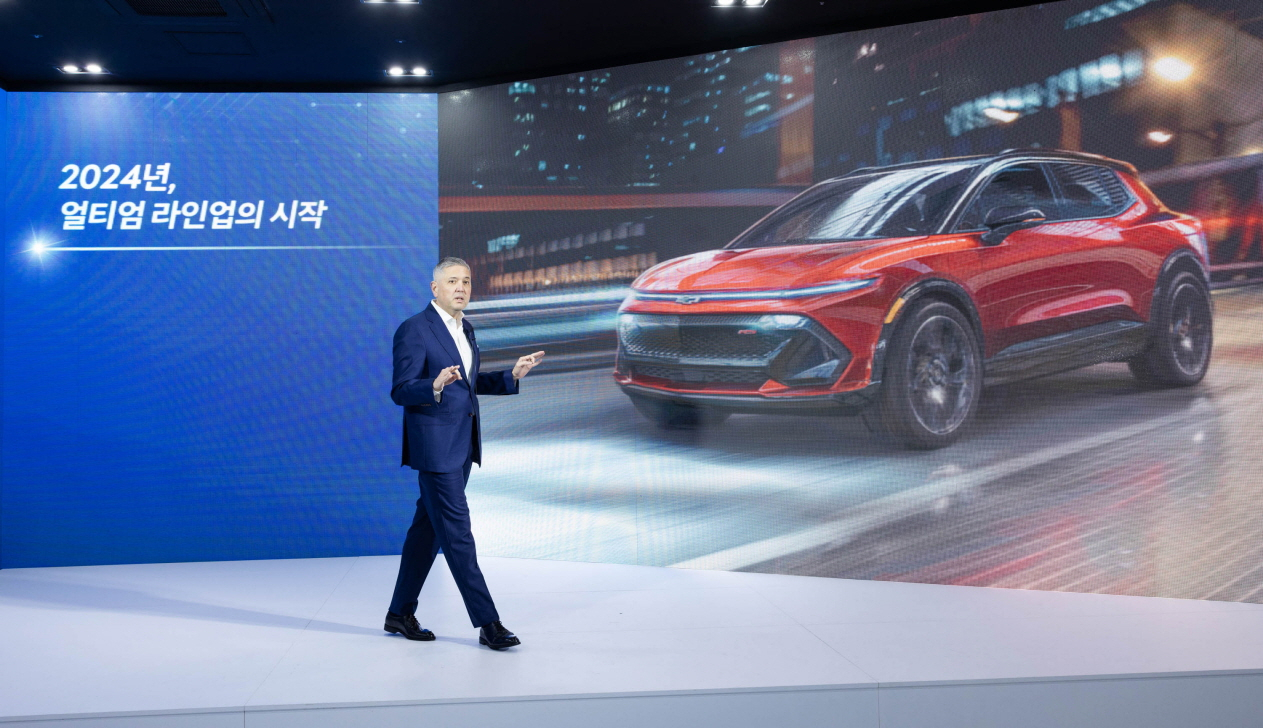 |
The Kia EV3, an entry-level electric vehicle showcased at the Busan International Mobility Show last month, runs on advanced nickel-manganese-cobalt batteries from the new HLI Green Power plant in Indonesia -- a collaboration between Hyundai Motor Group and LG Energy Solution. (Kia) |
The global battery industry is showing signs of a comeback amid a challenging market, with LG Energy Solution as one of the companies leading the charge. Their advanced nickel-manganese-cobalt batteries, typically reserved for pricier electric vehicles, are set to power upcoming mass-market models such as Kia’s EV3 and General Motors’s Chevrolet Equinox EV, setting the stage for a new era of affordable, high-performance electric vehicles.
The past year has been tough for the EV battery sector. From mid-2023 to early 2024, electric vehicle manufacturers saw shipments decline and inventories pile up. However, recent data from the Seoul-based energy sector analytics firm SNE Research indicates a recovery in global battery shipments and exports since hitting a low in February 2024, driven by the anticipated launch of several affordable EV models in the year’s second half.
The Chevrolet Equinox EV, with a starting price of $34,995, and the Kia EV3, expected to start around $30,000, are poised to make electric vehicles accessible to a broader audience. With long ranges -- 513 kilometers for the Equinox EV and over 500 kilometers for the EV3’s long-range model -- these vehicles aim to be perceived as not just economically viable but also practical.
“Korea’s battery sector, in particular, has had a tough time competing with China’s low-priced lithium iron phosphate batteries, but they’ve found a way to produce high-quality yet price-competitive NCM batteries through joint ventures and localized production,” said Rho Woo-ho, a battery sector analyst from Meritz Securities.
“By pooling resources and combining production volumes, a joint venture can achieve economies of scale, reducing per-unit costs. Also, LG Energy Solution’s joint ventures in regions like Indonesia benefit from local raw material availability and lower operational costs, while ventures in America benefit from the Inflation Reduction Act,” he added.
In a market pressured by high interest rates and rising inflation, 2024’s turning point may well be the success of budget-friendly EVs.
“The recent slowdown in global battery market growth is indeed tied to lower global demand for EVs, but we anticipate a rebound as automakers roll out new mass-market models to promote electrification. We’re committed to strengthening our partnerships with GM, Hyundai, and others in the second half of the year to speed up the EV market’s recovery,” said an LG Energy Solution official.
 |
At the start of this year, GM Korea's President Hector Villarreal announced the Chevrolet Equinox EV’s Korean launch, emphasizing its mass-market appeal and advanced Ultium Cells battery platform, a collaborative effort with LG Energy Solution. (GM Korea) |
The Ultium Cells 2 plant in Tennessee, a joint venture between LG Energy Solution and GM with a 2.7 trillion won ($1.5 billion) investment, began full operations in March this year. It is set to supply batteries for GM’s next-generation EVs, including the Chevrolet Equinox EV and the high-end Cadillac Lyriq, using high-energy-density nickel cobalt manganese aluminum pouch-type batteries. The plant will expand its production capacity to 50 gigawatt-hours, sufficient for approximately 600,000 high-performance EVs with a range exceeding 500 km.
LG Energy Solution received a record 1.313 trillion in cumulative IRA tax credits through the second quarter this year, thanks to their US battery production, making up 52.2 percent of their 2.51 trillion won cumulative operating income from the past six quarters. Despite these incentives, the battery maker’s latest second-quarter revenue fell to 6.16 trillion won, with operating profit dropping to 195.3 billion won, down 29.8 percent and 57.6 percent, respectively, from the previous year.
“With the Chevrolet Equinox EV coming to Korea later this year for the mass market and the 2024 Cadillac Lyriq aimed at luxury consumers, we will be covering both ends of the EV spectrum and hope to contribute to market recovery,” said a GM Korea official.
Similarly, Kia’s EV3, powered by NCM batteries from the HLI Green Power joint venture, will debut in the European market in the second half of the year. The EV4, a compact sedan, is expected to follow in early 2025 with the same battery technology. HLI Green Power, a joint battery manufacturing plant between Hyundai Motor Group and LG Energy Solution in Indonesia, began mass production earlier this month.
Initially, Kia was expected to use lower-cost Chinese batteries in all of its mid to low-priced models, including the EV3, to popularize EVs. For example, the Kia Ray EV used LFP batteries from CATL, and the Niro EV and Hyundai Kona Electric were equipped with CATL’s NCM batteries. The EV5, a mid-size SUV for the Chinese market, also featured BYD’s LFP battery to keep costs down.
Instead, by using price-competitive NCM batteries from Korean makers in EV3, Kia is not only reducing reliance on Chinese suppliers but also qualifying EV3 for greater government subsidies in Korea, which favor higher-density batteries.
“This pivot not only helps in mitigating negative perceptions of Chinese batteries in Korea but also leverages improved cost and performance advantages of NCM technology, positioning Korean battery makers like LG Energy Solution strongly in the global EV market, especially against Chinese competition,” said analyst Roh.







![[Today’s K-pop] Blackpink’s Jennie, Lisa invited to Coachella as solo acts](http://res.heraldm.com/phpwas/restmb_idxmake.php?idx=644&simg=/content/image/2024/11/21/20241121050099_0.jpg)